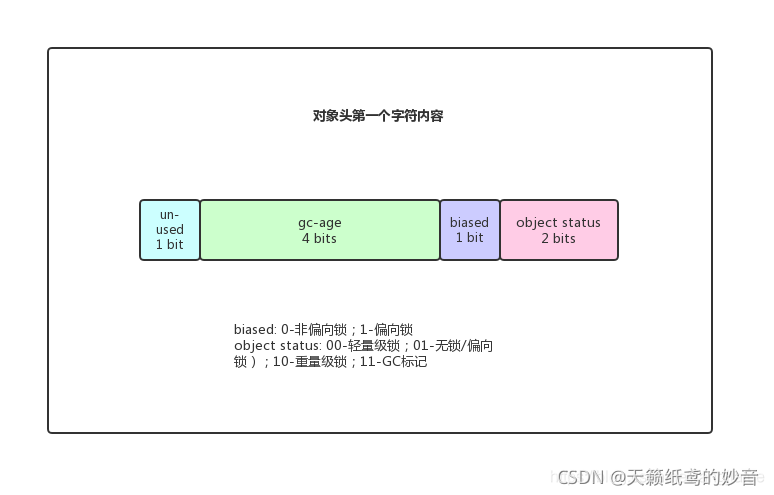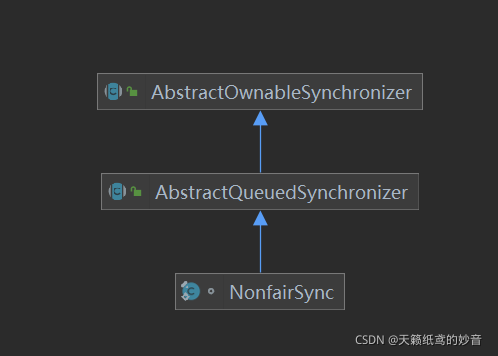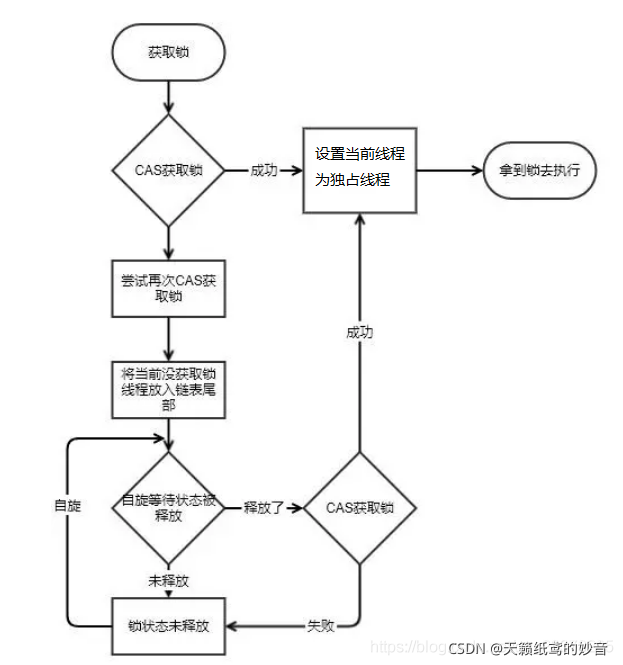一、sychronized
JAVASE1.6对其的优化,加入了偏向锁、轻量级锁、重量级锁的概念。
 ?
?
?OpenJDK的JOL可以来调试对象头信息。
1.偏向锁(‐XX:BiasedLockingStartupDelay=0该参数可以立即开启偏向锁)
当只有一个线程访问同步块时,会在锁对象的对象头和栈帧中存储锁的线程id。以后该线程进入则不需要进行CAS操作。只是简单的测试一下对象头中的MarkWord中是否记录该线程id,如果有则直接获取锁成功;如果没有则看是否对象头中有偏向锁的标识,有的话使用CAS方式将偏向锁的线程id指向该线程,否则使用CAS竞争。
2.轻量级锁
多个线程在不同时间段请求同一把锁,也就是同一时间段没有锁竞争。使用轻量级锁,来避免线程的阻塞以及唤醒。
3.重量级锁
当同一时刻有两个以上的线程尝试获取锁,会将偏向锁升级为重量级锁。
4.锁消除
如果方法内锁的对象不会被别的地方用到(无逃逸),将去除锁。
5.锁粗化
当出现多次连续的加锁或解锁过程,会将多次加解锁化为一次的加锁与解锁的过程。
二、Lock
?是java并发包中的类,是基于AQS(AbstractQueueSynchronizer=Node+state),通过CAS+自旋的方式实现的。以ReentrantLock为例
public class ReentrantLock implements Lock, java.io.Serializable {
public ReentrantLock() {
sync = new NonfairSync();
}
static final class NonfairSync extends Sync {
private static final long serialVersionUID = 7316153563782823691L;
/**
* Performs lock. Try immediate barge, backing up to normal
* acquire on failure.
*/
final void lock() {
if (compareAndSetState(0, 1))
setExclusiveOwnerThread(Thread.currentThread());
else
acquire(1);
}
protected final boolean tryAcquire(int acquires) {
return nonfairTryAcquire(acquires);
}
}
}

?
public abstract class AbstractQueuedSynchronizer
extends AbstractOwnableSynchronizer
implements java.io.Serializable {
static final class Node {
/** Marker to indicate a node is waiting in shared mode */
static final Node SHARED = new Node();
/** Marker to indicate a node is waiting in exclusive mode */
static final Node EXCLUSIVE = null;
/** waitStatus value to indicate thread has cancelled */
static final int CANCELLED = 1;
/** waitStatus value to indicate successor's thread needs unparking */
static final int SIGNAL = -1;
/** waitStatus value to indicate thread is waiting on condition */
static final int CONDITION = -2;
/**
* waitStatus value to indicate the next acquireShared should
* unconditionally propagate
*/
static final int PROPAGATE = -3;
volatile int waitStatus;
volatile Node prev;
volatile Node next;
volatile Thread thread;
Node nextWaiter;
final boolean isShared() {
return nextWaiter == SHARED;
}
final Node predecessor() throws NullPointerException {
Node p = prev;
if (p == null)
throw new NullPointerException();
else
return p;
}
Node() { // Used to establish initial head or SHARED marker
}
Node(Thread thread, Node mode) { // Used by addWaiter
this.nextWaiter = mode;
this.thread = thread;
}
Node(Thread thread, int waitStatus) { // Used by Condition
this.waitStatus = waitStatus;
this.thread = thread;
}
}
private transient volatile Node head;
private transient volatile Node tail;
private volatile int state;
protected final boolean compareAndSetState(int expect, int update) {
// See below for intrinsics setup to support this
return unsafe.compareAndSwapInt(this, stateOffset, expect, update);
}
private Node addWaiter(Node mode) {
Node node = new Node(Thread.currentThread(), mode);
// Try the fast path of enq; backup to full enq on failure
Node pred = tail;
if (pred != null) {
node.prev = pred;
if (compareAndSetTail(pred, node)) {
pred.next = node;
return node;
}
}
enq(node);
return node;
}
private void setHead(Node node) {
head = node;
node.thread = null;
node.prev = null;
}
public final void acquire(int arg) {
if (!tryAcquire(arg) &&
acquireQueued(addWaiter(Node.EXCLUSIVE), arg))
selfInterrupt();
}
protected boolean tryAcquire(int arg) {
throw new UnsupportedOperationException();
}
final boolean acquireQueued(final Node node, int arg) {
boolean failed = true;
try {
boolean interrupted = false;
for (;;) {
final Node p = node.predecessor();
if (p == head && tryAcquire(arg)) {
setHead(node);
p.next = null; // help GC
failed = false;
return interrupted;
}
if (shouldParkAfterFailedAcquire(p, node) &&
parkAndCheckInterrupt())
interrupted = true;
}
} finally {
if (failed)
cancelAcquire(node);
}
}
/**
* Convenience method to interrupt current thread.
*/
static void selfInterrupt() {
Thread.currentThread().interrupt();
}
}获取锁的流程

?
?